1 The importance of being digital
In recent years, Myanmar has seen rapid growth in ownership of smart phones and access to the internet.
Back in 2010, the percentage of population who accessed to internet was less than 0.3 per cent, amounting to a mere 130,000 users but by 2016, there were 13 million internet users. This is a growth of 100 times within six years and such growth is expected to continue (Myanmar Times 2018).
However, some people are still excluded. This is often because they lack the opportunities to access the internet or cannot afford a smart phone.
There are all sorts of benefits for society when people and organisations are able to use the internet to full effect. On an individual level, gaining digital skills can reduce isolation, increase career prospects and enable people to access health or education information. For organisations, becoming more digital is likely to increase visibility, efficiency and competitiveness. For society in general, being digitally confident empowers people to make their voices heard on issues that are important to them. Digital skills are also very important when it comes to studying.
There is more to succeeding online than just knowing how to do specific tasks. It is also important to be able to:
- judge who and what you can trust
- understand the essentials of ethical behaviour online
- communicate well with others.
Being ‘digital’ is about using technology to achieve your goals, whether those are related to work, everyday life or study. It involves thinking critically and making the decisions that are right for you and your life.
In the next section you will identify your starting point for this course by thinking about what technologies you currently use and what you do online.
Introduction
